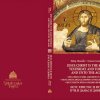Milan Radoje Vukcevich (Milan R. Vukčević) (March 11, 1937 – May 10, 2003) was a Yugoslav scientist, chess International Master, Grandmaster chess problem composer, and writer.
Vukcevich was born in Belgrade. In 1955 he won the Yugoslav Junior Championship, drawing a six game match with Bent Larsen in the same year. He became a chess International Master in 1958, and in 1960 played for Yugoslavia at the Chess Olympiad in Leipzig and had the second best overall score at the Student Chess Olympiad in Leningrad. In 1963 he moved to the United States, settling in Ohio.
.Vukcevich decided on a career in science rather than chess, and in the year he moved to the United States he entered the Massachusetts Institute of Technology. He went on to teach at Case Western Reserve University in Cleveland, Ohio for six years before leaving to work for General Electric, where from 1989 he was Chief Scientist. He was considered for a Nobel Prize in Chemistry and published two books on science.
Vukcevich continued to play chess. In 1969 he was joint winner of the U.S. Open Chess Championship, along with Pal Benko and Robert Byrne. In 1975 he finished third in the U.S. Championship, ahead of Samuel Reshevsky, Robert Byrne, Larry Evans and Arthur Bisguier among others. From 1976 to 1979 he played in the National Telephone League, scoring 16.5 from 22 games, including wins against Yasser Seirawan, Nick De Firmian, Leonid Shamkovich and Bisguier.
Vukcevich is better known as an author of chess problems than as a player, however, being the first American resident to be awarded the title of International Composition Grandmaster by FIDE. In 1981 he published Chess by Milan: Problems and Games of Dr. Milan R. Vukcevich and in 1998 was inducted into the US Chess Hall of Fame, becoming only the second person (after Sam Loyd) to be primarily inducted for their achievements in problem composition.
Vukcevich's compositions were gathered together in My Chess Compositions (2003). He composed in all genres, including directmates, selfmates, helpmates, problems with fairy pieces and a small number of endgame studies.
Vukcevich died in 2003 in Cleveland and is buried in Evergreen Hill Cemetery in Chagrin Falls, Ohio.[1] Milan's son Marko is a former guitar player in the band Mushroomhead from Cleveland, OH. The Vukcevich Super Cup was created in his honor soon after his death.
From Wikipedia






